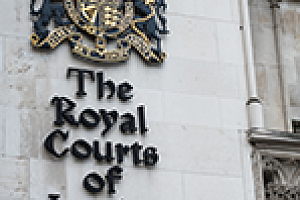Newsletter registration

Don’t refuse to mediate! Engage
Smile for the Camera?
ADHD diagnosis and disability
The coroner's duty to notify the DPP
Racist comments from one employee to another

Court of Protection case update: July 2025
Maximising ROI in renewable energy: Legal, technical, and financial strategies for net-zero success
Personal circumstances, public safety, and the planning balance
The Environment (Principles, Governance and Biodiversity Targets (Wales) Bill: the key provisions
Errors of law, materiality and remedies

What next for rent reviews?
Commonhold reform – the beginning of the end?
The CAT’s approach to Subsidy Decision Reviews: Fast, cheap and simple?
Millbrook Healthcare Limited v Devon County Council – Its impact on local government procurement
Early insights into the English Devolution and Community Empowerment Bill
The section 58 defence in the Highways Act 1980
Risk assessments in care proceedings: L-G and Re T
Turbulence ahead
PFI – a new era?
Costs in discrimination claims brought by litigants in person
The Building Safety Act and retrospective service charge protection
Right to Buy (RTB) leases — be warned about service charges
Awaab’s Law – implementation of Phase 1
Seven key insights: Lord Justice Birss considers AI in civil justice
Imperative requirements in homelessness: nuts and bolts on a bumpy roadmap to suitable accommodation
Neurodiversity in the Family Justice System Panel Discussion
Employment Law Webinar Series - May to July - 42 Bedford Row
Home Truths - Dissecting Section 16J: Criminal Confusion in the Renters’ Rights Bill - 42 Bedford Row
Home Truths: Grounds for Possession under the Renters' Rights Bill - 42 Bedford Row
Airport Subsidy Challenged in the CAT
IPA guidance 2025: Managing PFI distress and preparing for expiry
What might the public inquiry on child sexual exploitation look like
Data (Use and Access) Act – Updating Data Protection Law and more
High Court Dismisses Challenge to New Super Prison
AI, copyright and LLMs
Automatic suspensions and the public interest
FOI and communication
Too much?
Deploying ‘ADR’ in Planning & Compensation contexts
Removal from the village green register
The attendance of experts in family proceedings
Local authority enforcement powers and domestic beekeeping
Too little? When intervention is not required
Closures of educational sites
Public law case update Q1 2025
Must read
Families refusing access to support
Must read
Families refusing access to support
Local Government and Social Care Ombudsman annual report reveals impact of pandemic on complaints handling
The Local Government and Social Care Ombudsman undertook 3,330 detailed investigations between April 2020 and March 2021 - roughly covering the first year of the pandemic - and upheld 2,243 (67%) of them, according to its annual report.
- Details
Almost 13,000 complaints and enquiries were advanced beyond a phone call. 5,414 cases were closed after a basic check (such as whether the council has had time to consider the complaint), and 4,075 cases were dealt with by an initial investigation.
The remaining 3,330 cases saw a detailed investigation – the Ombudsman upheld complaints in 67%.
The 12 months from April 2020 saw the Ombudsman’s investigative practices change due to the pandemic. It chose to pause its usual operations for the first three months of the pandemic to reduce pressure on council services.
As a result, it dealt with 35% fewer cases in 2020-21 compared to the previous year.
Despite the pause at the beginning of the year, the watchdog issued 1,618 service improvement recommendations last year. As a proportion of its total number of recommendations, at 26%, this was higher than its previous year (20%).
Complaints relating to adult care services were the most common at 19% of all cases. Education and Children’s Services complaints followed with 16% of the share of complaints. Housing issues were the next most common at 14% of all complaints received.
In 2020-21, the Ombudsman handled a total of 32,372 complaints and enquiries from the public. Of these, 19,553 people received help on the telephone without requiring a case to be logged.
SIxty-five per cent of investigations were completed in 13 weeks. However, on its longer targets, the Ombudsman reported that it sometimes fell below target with 85% of cases in 26 weeks and 99% of cases in 52 weeks.
There were 28 cases in which the Ombudsman found its decision was not up to the expected standard, after it received 653 requests from complainants to review its decision.
The Ombudsman had a compliance rate from councils and care providers of 99.5%, and there were no instances of the Ombudsman issuing a formal notice of non-compliance.
The LGSCO also set up a specialist team for complaints related to Covid-19, which tracked the rapidly-changing legislation to assist the Ombudsman on decisions.
Over the course of the year, the Ombudsman published multiple reports, including one on the Homelessness Reduction Act and one on the circumstances of children in care.
It also issued a three-year plan detailing the problems the service faced and the powers that it would need to handle them.
The full report can be read here.
Adam Carey
Head of Governance & University Solicitor
Senior Lawyer - Advocate
Director of Legal and Governance (Monitoring Officer)
Head of Legal Shared Service
Locums
Poll
20-08-2025 10:00 am
15-09-2025 10:00 am
08-10-2025 10:00 am
22-10-2025 4:00 pm
05-11-2025 4:00 pm








































